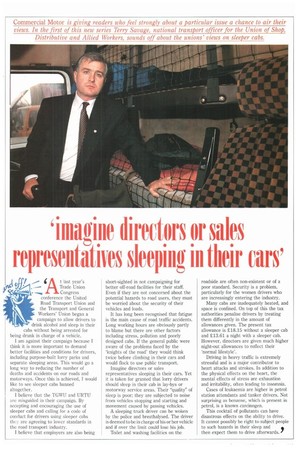gulag* throutprs or sales represelltatus sleopmg ill their cars'
Page 44

If you've noticed an error in this article please click here to report it so we can fix it.
t last year's Trade Union
• —.It Congress
conference the United Road Transport Union and the Transport and General Workers' Union began a campaign to allow drivers to drink alcohol and sleep in their cabs without being arrested for being drunk in charge of a vehicle.
Earn against their campaign because I think it is more important to demand better facilities and conditions for drivers, including purpose-built lorry parks and separate sleeping areas. This would go a long way to reducing the number of deaths and accidents on our roads and motorways. Once this is achieved, I would like to see sleeper cabs banned altogether.
I believe that the TGWU and URTU are misguided in their campaign. By accepting and encouraging the use of sleeper cabs and calling for a code of conduct for drivers using sleeper cabs they arc agreeing to lower standards in the road transport industry.
I believe that employers are also being short-sighted in not campaigning for better off-road facilities for their staff. Even if they are not concerned about the potential hazards to road users, they must be worried about the security of their vehicles and loads.
It has long been recognised that fatigue is the main cause of road traffic accidents. Long working hours are obviously partly to blame but there are other factors including stress, pollution and poorly designed cabs. If the general public were aware of the problems faced by the 'knights of the road' they would think twice before climbing in their cars and would flock to use public transport.
Imagine directors or sales representatives sleeping in their cars. Yet it is taken for granted that lorry drivers should sleep in their cab in lay-bys or motorway service areas. Their "quality" of sleep is poor; they are subjected to noise from vehicles stopping and starting and movement caused by passing vehicles.
A sleeping truck driver can be woken by the police and breathalysed. The driver is deemed to be in charge of his or her vehicle and if over the limit could lose his job.
Toilet and washing facilities on the roadside are often non-existent or of a poor standard. Security is a problem, particularly for the women drivers who are increasingly entering the industry.
Many cabs are inadequately heated, and space is confined. On top of this the tax authorities penalise drivers by treating them differently in the amount of allowances given. The present tax allowance is £18.15 without a sleeper cab and E13.61 a night with a sleeper cab. However, directors are given much higher night-out allowances to reflect their 'normal lifestyle'.
Driving in heavy traffic is extremely stressful and is a major contributor to heart attacks and strokes. In addition to the physical effects on the heart, the mental effects of stress are exhaustion and irritability, often leading to insomnia.
Cases of leukaemia are higher in petrol station attendants and tanker drivers. Not surprising as benzene, which is present in petrol, is a known carcinogen.
This cocktail of pollutants can have disastrous effects on the ability to drive.
It cannot possibly be right to subject people
to such hazards in their sleep and a then expect them to drive afterwards./




















































































